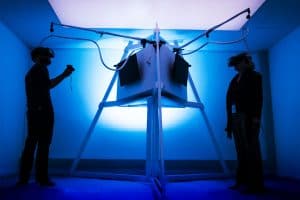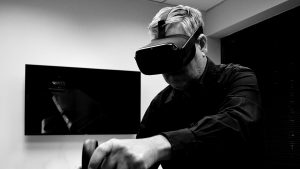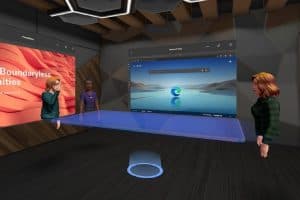Virtual Reality Training for Construction Safety
Virtual reality (VR) technology presents a tremendous opportunity for businesses to collaborate, communicate, and engage with employees and customers. For many years, the best business collaboration solutions have been limited text and video-based collaboration tools such as Jira, Slack, Webex, Teams, and Zoom. While these tools are extremely helpful, they have their limitations. Text-based business collaboration applications are great for messaging and sharing files, but lack more interactive elements. Video collaboration apps improve communication between participants, but fail to fully engage the audience.
In the last few years, virtual reality technology has advanced and has become a viable business solution to improve employee performance, collaborate with coworkers, and improve workflows. It is now possible to use digital solutions to collaborate and communicate with others in a more immersive environment. In this article, we explore the various ways companies are using virtual reality technology to transform their business collaboration.
Benefits of VR Technology for Business Collaboration
With virtual reality, people can go beyond existing communication technology like video and audio conferencing tools to have engaging interactions with colleagues. Virtual reality offers a new level of work collaboration to help businesses create the workplace of the future.
Stronger Team Dynamics
Compared to traditional methods, virtual reality makes remote meetings and collaborative work far more meaningful. While video conferencing enables face-to-face interactions, it limits communication to one to many. This is illustrated best in webinars where there is one main speaker and the other participants listen, but do not engage. Virtual reality encourages multiple and parallel communication. This replicates the traditional ‘office environment’ far more efficiently. Companies can support one or more simultaneous meetings within a virtual space.
Improve Meeting Focus
In virtual spaces, employees are more physically present during a session. Employees interact with others using body language and movement, sorting through digital information. Because virtual reality brings you into a space that’s completely dedicated to one specific meeting, it’s less likely that employees will end up getting distracted as is typical during video conferencing.
Immersive Experiences
Virtual spaces can be tailored to simulate workplace and employee needs. Meetings are no longer confined to your dull and fluorescent-filled conference room. Instead, employers can offer a variety of locales that can improve focus and productivity. These virtual spaces also allow meetings to include features necessary for the task at hand. For example, a brainstorming session can include an interactive whiteboard so that users can quickly sketch ideas or concepts. Meetings including client presentations can showcase fully rendered 3D models and slideshows. Virtual spaces offer immersive environments and tools that a typical meeting space cannot.
Remote Business Collaboration
The face-to-face office environment isn’t as common as it once was. Virtual and remote working are becoming the normal experiences of the future. As a result, businesses must continue to innovate and provide the best tools available. By providing these tools, businesses can stay ahead of their competition and improve employee productivity.
Virtual reality technology offers a new level of business collaboration to help
How VR Technology Can Impact Business Collaboration
Outside of the traditional office meeting, virtual reality can play a large role in several other collaborative environments.
Research & Development
Innovators are intrigued at the potential emerging technologies like VR have to advance academic research. Virtual reality enables researchers to create experimental setups without the limitations of the real world. In the real world, experimental controls are far more difficult to maintain than within a virtual environment. Virtual reality creates controlled and repeatable experimental setups without the cost needed to accurately manipulate experiments in the real world. These virtual reality end-to-end research tools are being utilized in a variety of fields including healthcare, travel, energy, retail, psychology, military, biology, and oceanology.
Product Innovation
In addition to general research practices, virtual reality technology has also produced considerable interest within product design and development. The manufacturing of products has become a complex process involving multiple departments and expertise. Most companies rely on CAD and BIM software to assist in the product development cycle. However, some businesses are beginning to understand the advantages of using virtual reality technology to optimize business collaboration for product design and development. Industries such as the military, aerospace, healthcare, retail, construction and automotive can leverage virtual reality to reduce time spent conceptualizing, revising, testing and developing new products. Product designers can work together within a virtual space in real time regardless of their physical location. This allows product designers to review renderings, test product quality, and quickly deliver feedback in a collaborative environment. Product designers and clients get a better vision of the final product making the entire process far more efficient than any current tools allow.
Employee Training
Virtual reality has established its value as a tool to teach concepts and train users in a safe, measurable, and repeatable way. Several industries put employees at risk while performing workplace training. VR training enables employees to train on dangerous situations, such as handling toxic chemicals or working under hazardous situations, in a safer environment. This trains employees to perform those tasks with greater proficiency and enhanced safety in the real world. Not only is virtual reality training safer, but it is also far less costly. Immersive learning has also proven effective in improving employee skills through visualization. With inbuilt gamification, businesses can make training more fun and a memorable experience for the employees.
Business Networking
Business networking is a common and valuable activity among successful companies. Virtual reality expands a user’s ability to connect with others on a massive scale. For example, employees can participate in local and international events without physically attending them. Virtual events were quite prominent in 2020 against the backdrop of coronavirus. These virtual conferences, trade shows and workshops are helping companies network with colleagues and prospects without incurring travel expenses. Participants can engage in group sessions, view presentations, and speak with others on the event floor. Vital information such as business information can be quickly shared amongst participants. Event organizers and vendors can deliver far more immersive experiences compared to the traditional ‘open warehouse’ setting. Additionally, event organizers will gain greater visibility in important metrics such as registrations, event and session attendance, product interest, and much more. All this information adds greater value to your vendors who will be interested in better understanding their audiences. Whether you are attending or hosting a conference, virtual reality has a multitude of benefits to maximize your investment.
Conclusion
Fully immersive virtual reality technology is transforming the way businesses collaborate and work. Companies can use VR technology for building collaborative business solutions for almost all aspects of their work. VR technology is becoming cheaper and widely available. Businesses keen on preparing for the future of work should invest in virtual reality applications. Interested in exploring the benefits of VR collaboration for your company? Contact Invonto today for scheduling a call with our team.



